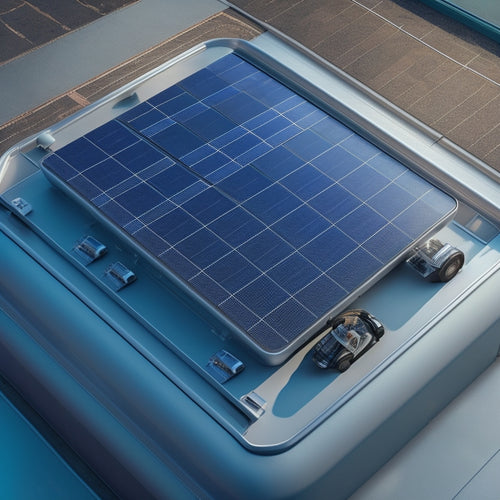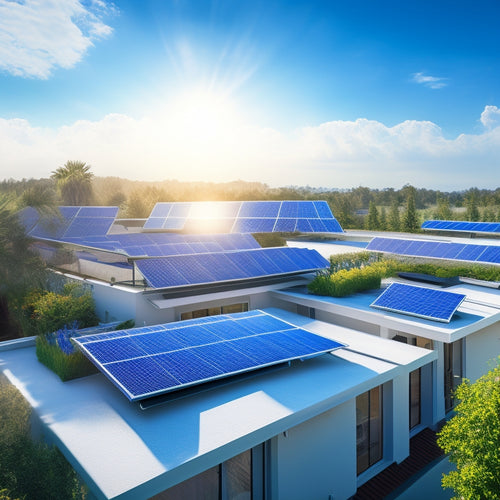
Is a Solar Power System a Smart Business Investment
Share
You're considering investing in a solar power system for your business, and you're wondering if it's a smart move. The answer is yes. With a solar power system, you can mitigate initial installation costs through financing options and reap long-term savings through reduced energy bills and tax incentives. You'll also reduce your energy dependence risks, enhance your brand reputation, and increase your property value. Plus, you'll benefit from government incentives and a competitive advantage in the market. As you investigate the advantages of solar power, you'll uncover even more ways to maximize your return on investment.
Key Takeaways
- Solar power systems offer substantial long-term savings through reduced energy bills and tax incentives, making them a smart business investment.
- Investing in solar energy reduces reliance on fossil fuels, mitigating energy price volatility and grid outage risks that can disrupt business operations.
- Solar power enhances a company's brand reputation and appeal, attracting eco-conscious consumers and increasing property value potential.
- Government incentives, such as federal tax credits and state rebates, significantly shorten the investment payback period, making solar more financially attractive.
- Regular maintenance ensures peak performance and energy output, maximizing the return on investment and minimizing operating expenses.
Financial Benefits of Solar Power
Your wallet stands to benefit considerably from investing in a solar power system. The initial installation costs may seem challenging, but financing options are available to alleviate the upfront burden. A thorough return analysis will reveal the long-term savings, which can be substantial.
In addition, tax implications such as credits and deductions can also offset the costs. As you consider energy storage and grid integration, you'll appreciate the system's scalability, allowing you to expand or modify as needed.
Technology advancements continue to drive down costs and improve efficiency, making solar power an attractive investment. Current market trends also indicate a strong demand for renewable energy, increasing the value of your investment.
Moreover, maintenance requirements are relatively low, ensuring your system remains productive with minimal upkeep. By investing in a solar power system, you're not only reducing your environmental footprint but also securing a smart financial move.
Reducing Energy Dependence Risks
As you consider investing in a solar power system, you're likely thinking about reducing your energy dependence risks.
You're exposed to energy price volatility, which can greatly impact your bottom line, and you're also at risk of grid outages that can disrupt your operations.
Energy Price Volatility
Several factors contribute to energy price volatility, and one of the most notable is the fluctuating cost of fossil fuels.
As a business owner, you understand the importance of financial forecasting and risk management. Energy price volatility can greatly impact your bottom line, making it challenging to develop effective investment strategies.
To mitigate these risks, it's crucial to understand the factors contributing to energy price volatility:
-
Market fluctuations: Changes in global demand and supply can cause energy prices to fluctuate rapidly.
-
Energy trends: Shifts in energy consumption patterns, such as increased adoption of renewable energy sources, can impact energy prices.
-
Economic impacts: Economic downturns or upswings can influence energy demand and prices.
- Pricing models: Complex pricing models can lead to unpredictable energy costs.
Grid Outage Protection
Energy price volatility is just one aspect of the risks associated with relying on the grid for your energy needs.
Another significant risk is grid outages, which can bring your business to a grinding halt. You can't afford to have your operations disrupted by power outages, especially if you're in a critical sector like healthcare or finance.
Supply Chain Disruptions
Your factory's production line hums along smoothly, until a sudden supply chain disruption brings it to a screeching halt. A vital component is delayed, and your entire operation grinds to a halt. This is a harsh reality many businesses face, but it doesn't have to be yours.
By investing in a solar power system, you can reduce your energy dependence risks and mitigate the impact of supply chain disruptions.
Supply chain management is essential in today's global economy, and solar panel sourcing is no exception. When you generate your own clean energy, you're less reliant on external factors that can cause disruptions.
Here are some key benefits:
- Reduced reliance on grid electricity means you're less affected by supply chain disruptions
- Solar power systems provide a stable source of energy, reducing production downtime
- You can focus on your core business, rather than worrying about energy supply chain risks
- Investing in solar power demonstrates your commitment to sustainability and corporate social responsibility
Environmental Impact on Brand
As companies strive to establish a strong brand identity, they must consider the environmental impact of their operations, including their energy sourcing decisions.
You're likely aware that consumers are increasingly eco-conscious, and their purchasing decisions are influenced by a company's commitment to sustainability. By investing in a solar power system, you can enhance your sustainable branding and improve consumer perception of your organization. This, in turn, can lead to increased brand loyalty and a positive social impact.
Implementing eco-friendly initiatives like solar power demonstrates your corporate responsibility and dedication to environmental stewardship. This can be a key differentiator in a competitive market, allowing you to stand out through green marketing efforts.
Additionally, a solar power system can contribute to a reduced carbon footprint, further solidifying your commitment to environmental sustainability. By prioritizing sustainability, you can reap the benefits of enhanced brand reputation, improved customer loyalty, and increased business value.
Government Incentives for Businesses
What if you couldn't only reduce your carbon footprint but also reap financial benefits from the government for doing so?
By investing in a solar power system, you can take advantage of various government incentives designed to promote the adoption of renewable energy.
These incentives include:
-
Federal tax credits: Claim a credit of up to 30% of the total cost of your solar power system.
-
State rebates and financing options: Many states offer rebates, low-interest loans, or other financing options to help offset the upfront cost of going solar.
-
Solar grants and utility incentives: Receive grants or incentives from your utility company for installing a solar power system.
- Renewable energy certificates, tax deductions, and depreciation benefits: Sell renewable energy certificates, claim tax deductions, and benefit from depreciation benefits to further reduce your costs.
Increasing Property Value Potential
Installing a solar power system not only yields financial benefits from government incentives but also enhances your property's value. This is because a solar power system is a desirable feature that increases property appeal, making it more attractive to potential buyers or tenants. As a result, you can expect to see an increase in your property's value, which can lead to a higher selling price or rental income.
In today's market, there's a growing demand for sustainable and eco-friendly properties. By installing a solar power system, you're catering to this market demand and differentiating your property from others. This can give you a competitive edge when it comes to selling or renting your property.
According to various studies, properties with solar power systems sell faster and for a higher price than those without. So, not only will you benefit from the financial incentives, but you'll also reap the rewards of a higher property value.
Energy Savings Over Time
By the time your solar power system is up and running, you'll start seeing a significant reduction in your energy bills. This is because solar power systems generate electricity on-site, reducing your reliance on the grid and subsequent energy consumption. As a result, you'll notice a decrease in your energy expenditure over time.
-
Your energy savings will be even more pronounced as energy consumption trends continue to rise, making traditional energy sources more expensive.
-
Solar technology advancements have improved the efficiency of solar panels, allowing them to generate more power per hour of sunlight.
-
With a solar power system, you'll be locking in a fixed energy rate for the next 25 years or more, protecting yourself from fluctuating energy prices.
- As the system generates electricity, you'll be reducing your overall energy costs, freeing up more resources to invest in your business or personal pursuits.
Reducing Carbon Footprint Costs
By investing in a solar power system, you'll not only reduce your carbon footprint but also benefit from renewable energy incentives, lower operating expenses, and energy efficiency gains.
These advantages will help offset the initial investment costs and provide long-term savings.
As you investigate the possibilities of solar power, it's crucial to understand how these factors can impact your bottom line.
Renewable Energy Incentives
As you consider investing in a solar power system, it's essential to investigate the various renewable energy incentives available, which can greatly reduce the costs associated with reducing your carbon footprint.
These incentives can considerably impact your investment payback period, making solar power a more viable option for your business.
Some of the key renewable energy incentives to examine include:
-
Tax Credits: Claim a percentage of your solar system's installation costs as a tax credit, reducing your tax liability.
-
Solar Grants: Apply for grants offered by government agencies, foundations, or corporations to cover a portion of your solar system's installation costs.
-
Financing Options: Take advantage of specialized financing options, such as power purchase agreements or property-assessed clean energy financing, to reduce upfront costs.
- Renewable Subsidies: Utilize subsidies offered by utility companies, government agencies, or other organizations to offset the costs of installing and maintaining your solar system.
Lower Operating Expenses
Beyond the incentives, a solar power system can considerably lower your operating expenses, thereby reducing the costs associated with your carbon footprint.
By utilizing renewable energy, you can minimize your reliance on traditional energy sources and subsequently decrease your energy expenditures. With energy monitoring, you can track your energy consumption and identify areas for improvement, further optimizing your operational efficiency.
A thorough cost analysis will reveal that a solar power system can provide a significant return on investment, especially when considering the system's scalability and potential for future expansion.
Additionally, you can take advantage of tax benefits and financing options to offset the initial investment. As technology advancements continue to improve system efficiency, your return expectations will only increase.
Energy Efficiency Gains
In tandem with reduced operating expenses, investing in a solar power system yields significant energy efficiency gains, directly translating to lower carbon footprint costs.
By integrating solar power into your operations, you'll not only reduce your reliance on fossil fuels but also optimize your energy usage.
To achieve this, you can:
- Conduct energy audits to identify areas of inefficiency and implement efficiency upgrades to minimize energy waste
- Utilize technology advancements in system monitoring and performance metrics to analyze your energy usage and pinpoint opportunities for improvement
- Invest in employee training and behavioral changes to promote sustainability practices throughout your organization
- Collaborate with utility partnerships to access cost analysis tools and optimize your energy strategy
Competitive Advantage Opportunities
With a solar power system investment, you're not only reducing your reliance on the grid and cutting energy costs, but also unblocking competitive advantage opportunities that can set your business apart.
By going solar, you're making a commitment to sustainability, which can be a powerful market differentiation strategy. This can help you appeal to environmentally conscious consumers, who are increasingly seeking out businesses that share their values.
In addition, a solar power system can be a significant asset in enhancing brand loyalty. When you showcase your commitment to renewable energy, you're demonstrating a willingness to invest in a cleaner, healthier future.
This can lead to increased customer loyalty, as consumers are more likely to support businesses that share their values. Moreover, you can use your solar power system as a marketing opportunity, highlighting your sustainable practices and attracting like-minded customers.
Long-Term System Maintenance
Through the lifespan of your solar power system, regular maintenance is essential to confirm peak performance, energy output, and longevity.
You'll want to guarantee your system operates at maximum capacity to reap the benefits of your investment.
To achieve this, consider the following:
-
Routine Inspections: Schedule regular checks to identify potential issues before they impact system performance. This helps minimize repair costs and downtime.
-
Performance Monitoring: Keep a close eye on your system's energy output to detect any declines in performance. This enables you to address issues promptly and optimize system longevity.
-
Service Agreements: Invest in a service agreement that provides warranty coverage and access to professional training for maintenance and repairs. This ensures you're equipped to handle any issues that arise.
- Technology Upgrades: Stay up-to-date with the latest advancements in solar technology to maximize your system's efficiency and equipment lifespan.
Frequently Asked Questions
Can Solar Panels Be Installed on Rooftops With Existing Skylights or Vents?
When you consider solar panels, you'll need a rooftop assessment to determine compatibility with existing skylights or vents. You can integrate skylights with solar panels, but it requires careful planning and execution to guarantee a seamless installation.
How Does Solar Power Affect My Business's Insurance Premiums?
You'll likely see a minimal impact on your insurance premiums, as solar panels are typically considered a low-risk addition; however, your insurer will still conduct a risk assessment, potentially adjusting your insurance cost based on the system's value and installation.
Are Solar Power Systems Compatible With All Electrical Grids?
You'll be interested to know that 85% of commercial solar installations are grid-connected, but you'll face grid integration challenges; fortunately, energy storage solutions can mitigate these issues, ensuring seamless solar power system integration with your electrical grid.
Can Solar Panels Be Moved to a New Location if the Business Relocates?
When you relocate, you'll face solar panel relocation challenges; fortunately, you can reinstall them at your new site, but be prepared to reassess installation logistics, including permits, wiring, and potential roof modifications to guarantee a smooth changeover.
Do Solar Power Systems Require Special Permits or Licenses?
When installing solar panels, you'll need to traverse solar installation regulations, which vary by state and locality, requiring you to secure necessary permits through a permit application process that can be complex and time-consuming.
Related Posts
-

Top Solar Panels for Car Battery Maintenance
When selecting top solar panels for car battery maintenance, consider high-efficiency models with high wattage output...
-

Reduce Solar Panel Cost for Your Small Home
By evaluating your energy needs, choosing the right installer, and selecting cost-effective solar panel options, you ...
-

Best Solar Panel Options for Maximum Energy Savings
You can maximize your energy savings with solar panels that boast efficiency ratings above 20%, paired with extensive...


